Last week, Justice Stephen Breyer announced that he is retiring after serving more than two decades on the nation’s highest court. He is known for being the most pragmatic justice on the bench, opposing the originalism approach. Considered one of the best writers in the federal court system, Breyer has authored several books on constitutional law, economic regulation, and administrative law.
Continue reading to learn more about Justice Breyer and how to research his career and major rulings in HeinOnline.
From the Beginning
Stephen Breyer was born in San Francisco, California, where he was raised in a middle-class Jewish family. Through his parents, Breyer learned the importance of pubic service. His father, Irving, served as legal counsel to the San Francisco Board of Education. His mother, Anne, was a volunteer for the League of Women Voters.
Breyer attended Lowell High School. A member of the Lowell Forensic Society, he regularly debated in high school tournaments alongside future Harvard professor Laurence Tribe. He graduated in 1955 and was voted “most likely to succeed” by his classmates.
College and Law School
Breyer continued his education and studied philosophy at Stanford University where he was a member of Phi Beta Kappa. He graduated in 1959 with high honors and his Bachelor of Arts. He furthered his education and studied philosophy, politics, and economics at Magdalen College in England where he received his second Bachelor of Arts.
Returning to the United States, Breyer earned a Bachelor of Laws degree and graduated magna cum laude from Harvard Law School in 1964. During this time, he also worked as an editor on the Harvard Law Review.
Early Legal Career
To kickstart his legal career, Breyer served as a law clerk to then Justice Arthur Goldberg of the Supreme Court between 1964 and 1965. For the next two years, he became a special assistant to the U.S. Assistant Attorney General for Antitrust.
In 1967, Breyer returned to Harvard Law School to teach and soon became known as the leading expert on administrative law. While there, he authored a heavily cited skeptical analysis of copyright.[1]Stephen Breyer, The Uneasy Case for Copyright: A Study of Copyright in Books, Photocopies, and Computer Programs, 84 HARV. L. REV. 281 (1970). This article can be found in HeinOnline’s Law Journal Library.
During his long tenure at Harvard, Breyer also served as an assistant special prosecutor on the Watergate Special Prosecution Force in 1973 amidst the Watergate Scandal. He also worked closely with Senator Edward Kennedy to pass the Airline Deregulation Act,[2]To amend the Federal Aviation Act of 1958, to encourage, develop, and attain an air transportation system which relies on competitive market forces to determine the quality, variety, and price of air services, and for other purposes., Public Law … Continue reading which removed federal control over fares, routes, and market of new airlines.
First Circuit
Stephen Breyer was confirmed to the First Circuit[3]122 J. Exec. Proc. S. U.S. 744 (1980). This document can be found in HeinOnline’s U.S. Congressional Documents database on December 9, 1980 following a nomination from President Jimmy Carter, to a new seat established by the Omnibus Judgeship Act of 1978,[4]To provide for the appointment of additional district and circuit judges, and for other purposes., Public Law 95-486, 95 Congress. 92 Stat. 1629 (1978). This Act can be found in HeinOnline’s U.S. Statutes at Large database which expanded the Federal Judiciary. He served on the First Circuit from 1980-1994 and sat as the Chief Judge from 1990-1994.
A Seat on the Supreme Court
Breyer was considered for the Supreme Court twice, both times by President Bill Clinton. The first spot, a replacement for Byron White, he lost to the notorious Ruth Bader Ginsburg. But his dedication paid off. Despite being hospitalized with broken ribs and a punctured lung from a bicycle accident, Breyer left the hospital to meet with President Clinton to discuss a vacancy on the court due to Harry Blackmun‘s retirement. He was later confirmed by the Senate[5]Roy M.; Jacobstein, J. Myron; Koneski-White, Bonnie L., Compilers Mersky. Supreme Court of the U.S. Hearings and Reports on Successful and Unsuccessful Nominations of Supreme Court Justices by the Senate Judiciary Committee (-). This … Continue reading on July 29, 1994.
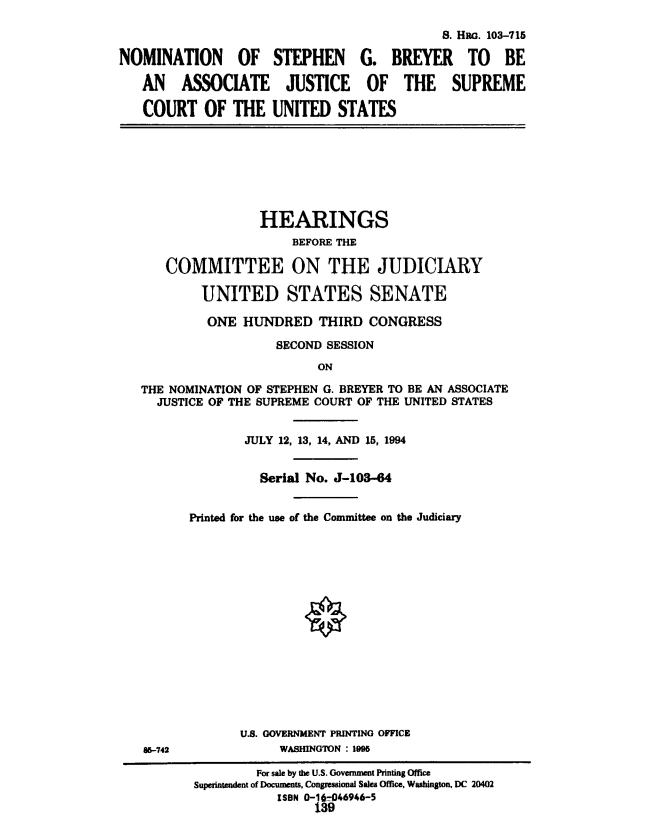
Notable Rulings
Although Stephen Breyer falls among the more liberal members of the Court, he is known for his cooperation with both political parties. Cass Sunstein said it best:[6]115 YALE L.J. 1672 (2006). This book review can be found in HeinOnline’s Law Journal Library
And in defending a pragmatic, purposive-oriented alternative, Breyer writes in a way that is unfailingly civil and generous to those who disagree with him, providing a model for how respectful argument might occur, even in a domain that is intensely polarized.
Through his entire term, he has authored 520 opinions. Let’s take a look at some of his notable rulings.
Abortion
In 2000, Breyer wrote the majority opinion for the landmark decision in Stenberg v. Carhart[7]Stenberg, Attorney General of Nebraska, et al. v. Carhart, 530 U.S. 914, 1020 (2000). This case can be located in HeinOnline’s U.S. Supreme Court Library where the Court struck down a law that made partial-birth abortions illegal. Later in 2016, Breyer again wrote an opinion for Whole Woman’s Health v. Hellerstedt[8]15-274 U.S. Reports 1 (2016) Whole Woman’s Health et al. v. Hellerstedt, Commissioner, Texas Department of State Health Services, et al. This slip opinion can be found in HeinOnline’s U.S. Supreme Court Library where the Court struck down a Texas law that placed restrictions on the delivery of abortion services, creating undue burden.
Pro Tip: Users can listen to opinion announcements and dissenting opinions by selecting the Oyez button within the HeinOnline interface:
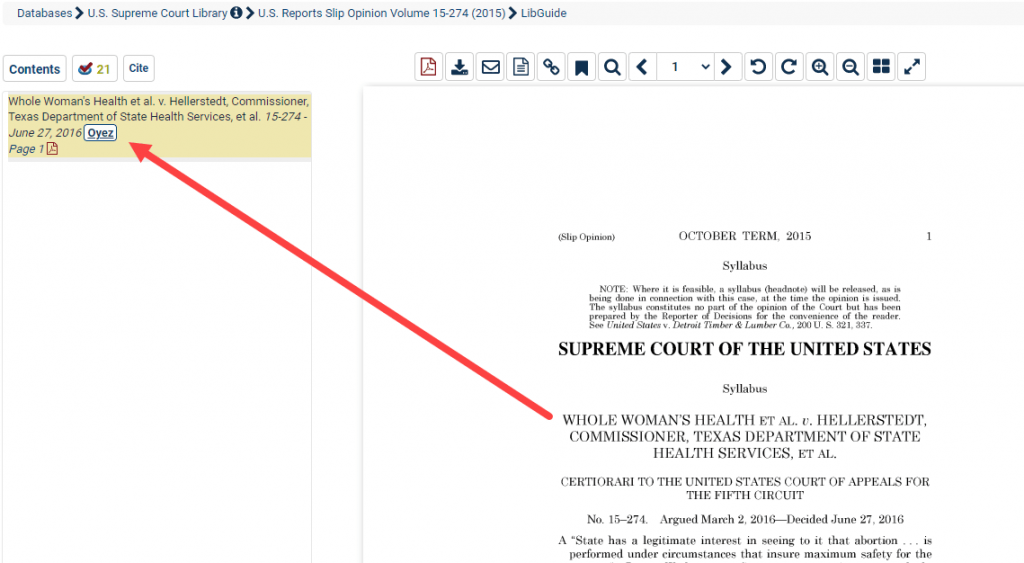
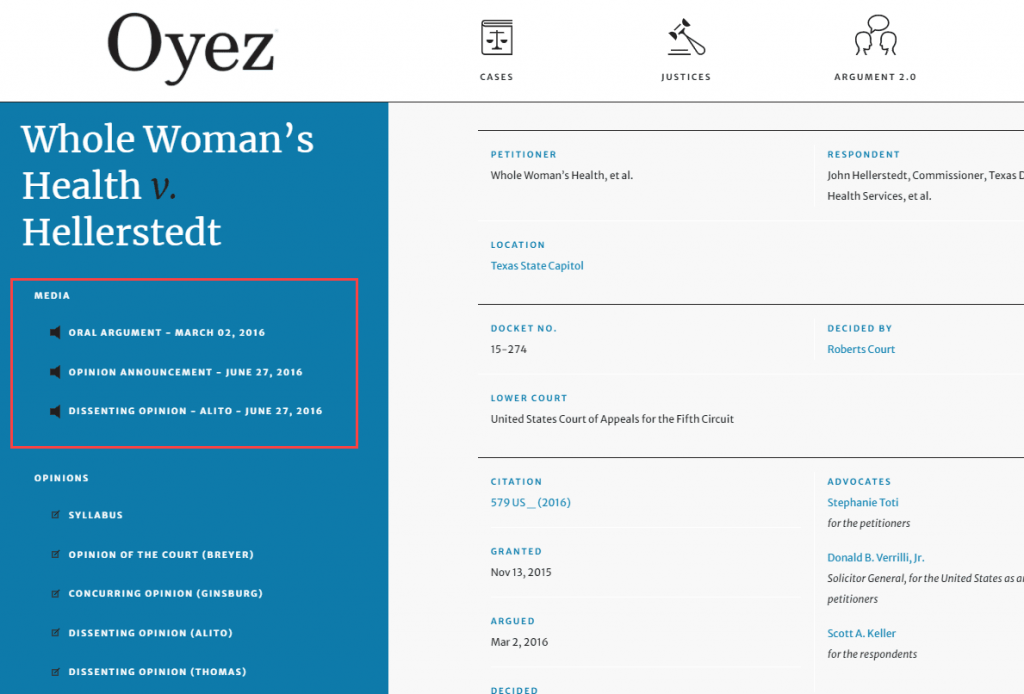
Death Penalty
In the death penalty case Glossip v. Gross,[9]14-7955 U.S. Reports 1 (2014) Glossip et al. v. Gross et al. This slip opinion can be found in HeinOnline’s U.S. Supreme Court Library Breyer dissented when the Court held that lethal injections using midazaloam to kill prisoners convicted of capital crimes did not constitute cruel and unusual punishment. He reiterated his dissent more recently in the 2020 death penalty case Barr v. Lee[10]20A8 U.S. Reports 1 (2020) William P. Barr, Attorney General, et al. v. Daniel Lewis Lee, et al. This slip opinion can be found in HeinOnline’s U.S. Supreme Court Library where he suggested the Court re-examine whether the death penalty violates the Constitution. Listen to Breyer’s oral argument by simply selecting the Oyez button within HeinOnline.
Breyer’s Scholarly Content in HeinOnline
Not only does HeinOnline have Stephen Breyer’s nomination hearings, but we have a dedicated author profile page where users can peruse his authored works.
To locate his author profile page, search for his name using the author option in the drop-down menu for the one-box search.
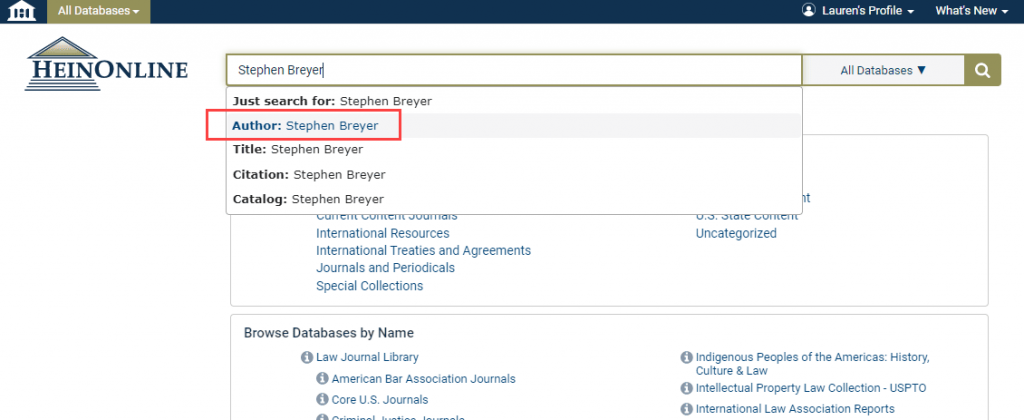
From the results page, select Breyer’s hyperlinked name to be directed to his author profile page.
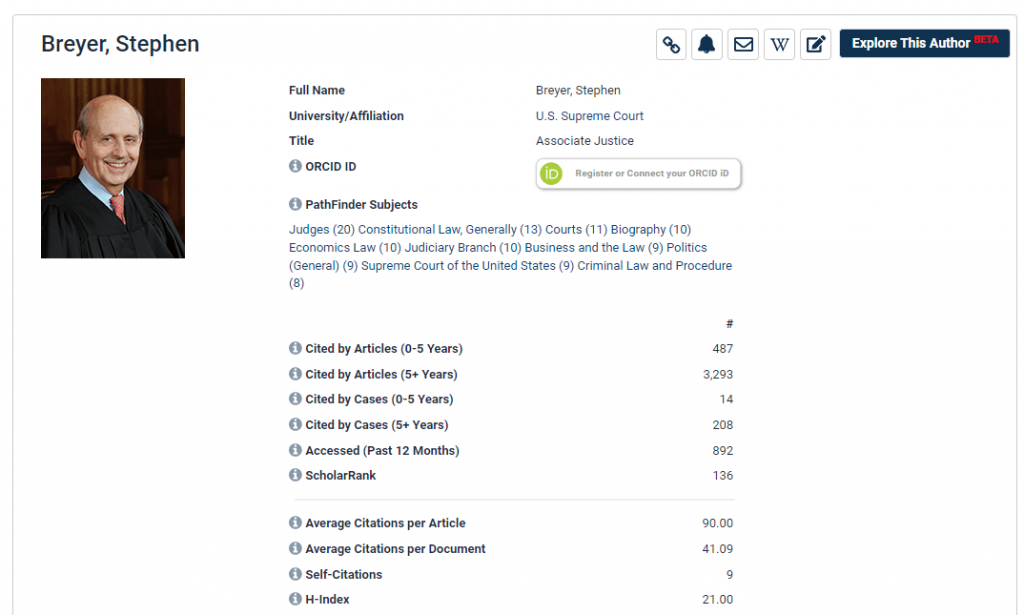
Within Stephen Breyer’s author profile page, users will find nearly 100 scholarly articles. What’s more, he’s ranked in HeinOnline’s Top 250 Authors! Check out his most-cited works:
- The Uneasy Case for Copyright: A Study of Copyright in Books, Photocopies, and Computer Programs
- On the Uses of Legislative History in Interpreting Statutes
- The Federal Sentencing Guidelines and the Key Compromises Upon Which They Rest
- Judicial Review of Questions of Law and Policy
President Joe Biden has stated he will uphold his campaign promise of nominating the first Black woman to the high court as Breyer’s seat will soon be open. Stay tuned to the HeinOnline Blog as we continue to cover this evolving story. Want to see more posts like this? Check out our dedicated Supreme Court blogs below.
HeinOnline Sources[+]
| ↑1 | Stephen Breyer, The Uneasy Case for Copyright: A Study of Copyright in Books, Photocopies, and Computer Programs, 84 HARV. L. REV. 281 (1970). This article can be found in HeinOnline’s Law Journal Library. |
|---|---|
| ↑2 | To amend the Federal Aviation Act of 1958, to encourage, develop, and attain an air transportation system which relies on competitive market forces to determine the quality, variety, and price of air services, and for other purposes., Public Law 95-504, 95 Congress. 92 Stat. 1705 (1978). This Act can be found in HeinOnline’s U.S. Statutes at Large database. |
| ↑3 | 122 J. Exec. Proc. S. U.S. 744 (1980). This document can be found in HeinOnline’s U.S. Congressional Documents database |
| ↑4 | To provide for the appointment of additional district and circuit judges, and for other purposes., Public Law 95-486, 95 Congress. 92 Stat. 1629 (1978). This Act can be found in HeinOnline’s U.S. Statutes at Large database |
| ↑5 | Roy M.; Jacobstein, J. Myron; Koneski-White, Bonnie L., Compilers Mersky. Supreme Court of the U.S. Hearings and Reports on Successful and Unsuccessful Nominations of Supreme Court Justices by the Senate Judiciary Committee (-). This document can be found in HeinOnline’s History of Supreme Court Nominations database |
| ↑6 | 115 YALE L.J. 1672 (2006). This book review can be found in HeinOnline’s Law Journal Library |
| ↑7 | Stenberg, Attorney General of Nebraska, et al. v. Carhart, 530 U.S. 914, 1020 (2000). This case can be located in HeinOnline’s U.S. Supreme Court Library |
| ↑8 | 15-274 U.S. Reports 1 (2016) Whole Woman’s Health et al. v. Hellerstedt, Commissioner, Texas Department of State Health Services, et al. This slip opinion can be found in HeinOnline’s U.S. Supreme Court Library |
| ↑9 | 14-7955 U.S. Reports 1 (2014) Glossip et al. v. Gross et al. This slip opinion can be found in HeinOnline’s U.S. Supreme Court Library |
| ↑10 | 20A8 U.S. Reports 1 (2020) William P. Barr, Attorney General, et al. v. Daniel Lewis Lee, et al. This slip opinion can be found in HeinOnline’s U.S. Supreme Court Library |



